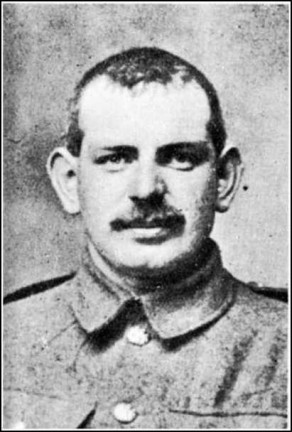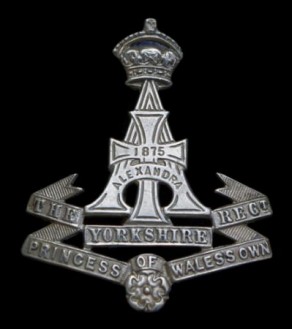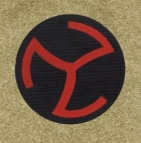13 October 1916
MAWSON – September 21st of wounds received in action, Private R. H. Mawson, of the Prince of Wales’ Own Yorkshire Regiment, the only son of Mr. and Mrs. T.W. Mawson, Valley View, Bradley, aged 28.
13 October 1916
FIRST BRADLEY SOLDIER KILLED
News has been received by Mr. and Mrs. T.W. Mawson of Valley View House, Bradley, that their son, Private R. H. Mawson, of the Prince of Wales’ Own Yorkshire Regiment, has died from wounds received in action on September 21st. Private Mawson, who was 28 years of age, joined the forces on February 28th and went to France in June. Enclosed with the letter from the Infantry Record Office, York, was a slip of paper on which was the following message:– “The King commands me to assure you of the true sympathy of His Majesty and the Queen in your sorrow. Signed, D. Lloyd George.”
Much sympathy is felt for the parents in the loss they have sustained of their only son.
A memorial service was held on Sunday morning at the Primitive Methodist Chapel, the deceased being formerly a scholar in the Sunday School. The service was conducted by Messrs. W.J. Mitchell and J. Gill. Misses A. Benny and E.A. Gill contributed solos, and Tennyson’s ‘Crossing the Bar’ was rendered by the choir. The Roll of Honour was read, on which the names of 13 scholars appeared, who are now serving their Country. The organist was Miss Gill.
27 October 1916
BRADLEY
THE LATE PTE. MAWSON – Some light on the death of Private R. H. Mawson has been shed by a letter received by Mr. W. J. Mitchell from Second Lieut. W. M. Slater, the officer commanding the battalion, dated October 16th, from France. He says: “In answer to yours of the 2nd inst. re. 27647 Pte. R. H. Mawson. This soldier was wounded on the 17th September whilst assisting to get the wounded away. He was hit in the back by a bullet and was some distance from the company at the time, so I regret to say that I can give you no further particulars. Please convey my sincerest sympathy to his family.”
27 April 1917
ANOTHER BRADLEY SOLDIER KILLED
Mr. and Mrs. Walker Blades, of Prospect Terrace, Bradley, received the following letter last week from Lance-Corpl. J. Littlewood, of the Duke of Wellington’s West Riding Regiment:– “ It is with deepest regret and sympathy that I beg to inform you of your son’s death. He was killed by shrapnel yesterday, the 14th, and was buried last night. He was a good workmate, and I sincerely regret his loss. He was buried in an English grave and had a proper funeral service.”
Pte. Albert Blades, of the West Yorkshire Regiment, who was 22 years of age, was the only son of the above, and enlisted on March 28th, 1916. He went to France on Jan. 12th. The lad was of a quiet and retiring disposition, but all his letters breathed a love of home and parents, for whom the deepest sympathy is felt. He was formerly employed as shoemaker by Mrs. Walker, of Skipton.
The following letter was received by Pte. Blades’s parents yesterday morning from Private Joe Harry Mawson, another Bradley lad:–
“I beg to extend to you and your family my deepest sympathy in your sad bereavement, and I most sincerely pray that God will comfort and sustain you until that day dawns when you will be re-united in the Better Land. The news came as a great shock to me this morning. I made enquiries about him and learnt that he was wounded in the back and died in hospital. I have seen the place where he is buried, and let me assure you that he has been buried respectably. At present there is nothing but a bottle with his name, number, and date of funeral, ‘Pte. A. Blades. No. 4604, 14/4/17,’ but in the course of a few days there will probably be a small wood cross put up to mark the place. I have been talking to his sergeant, and he told me he was a good soldier. There is only one consolation for you, that is that he has done his duty, and paid the highest sacrifice for the sake of humanity.”
A memorial service was held in the Wesleyan Chapel on Sunday morning, conducted by Mr. Herbert Thornton, who said that it was their painful experience to have to record the passing away of another of their lads on the field of battle. Never surely in the history of mankind was there so much anguish and heartbreak on account of loved ones who had been prematurely cut off. Rachel’s weeping for their children because they are not. Well might they cry out “How long, O Lord, how long?” When would the toll for human misunderstanding, avarice and inordinate ambition be expiated. They little thought a week ago, when paying a tribute to Sydney Mattock, that even then Albert had found a last resting place upon a foreign shore. Yet, so it was, and his death made the sixth of their lads who had laid down their lives in their country’s cause, viz., Willie Brayshay, while in training on Salisbury Plain; Robert Henry Mawson, Leonard Throup, John Sydney Mattock, James Henry Peel, and lastly, they hoped, and so far as they knew, Albert Blades. Albert was of a quiet disposition; he didn’t wear his heart upon his sleeve, his innermost thoughts and aspirations were rarely, if ever, expressed. He was diligent and plodding, kind-hearted and considerate, strongly attached to all at home, purposely avoiding in his letters anything calculated to give uneasiness or anxiety. Consequently, it was not known definitely whether he was killed in action or hit with shrapnel behind the line. He attested on his 21st birthday, and joined the Duke of Wellington’s Regiment. He was one of their own lads, having passed through the Sunday School, and previous to enlisting was connected with Mr. Bray’s Young Men’s Class. He was also a frequent attender at public worship, and in your name and my own I extended to the bereaved relatives their sincere sympathy. It was some consolation to know that his death brought no remorse, that his end had not been hastened by fast and profligate living; he has died fighting your cause and mine. Death met him in the discharge of his duty. What worthier end? In the words of Mazzini, I would say “Life is a mission duty its highest aim,” for unselfish actions never die. May some comfort come to all those who were bitterly mourning the loss of loved ones at this time, from the thought that their life was given up in the most momentous struggle in history, and that they sacrifice their all in order that right and freedom should triumph and the world be made a brighter and a happier place in which to live.
All through life I see a cross
Where sons of God yield up their breath,
There is no gain except by loss,
No life – except by death.
At the close of the service ‘O rest in the Lord’ was played by the organist, Mr. Chapman.
21 September 1917
In loving memory of Pte. Robert H. Mawson, Prince of Wales’ Own Yorkshire Regiment, who died of wounds received in action in France, Sept. 21st, 1916, aged 28 years.
“Sleep on, dear friend, in a far off land,
In a grave we may never see;
But as long as life and memory last
We will remember thee.”
“Gone, but not forgotten.”
Miss Helliwell, Farnhill; also remembered by Mrs. Greenwood.
20 September 1918
MAWSON – In loving memory of Pte. Robt. H. Mawson, Prince of Wales’ Own Yorkshire Regiment, who died of wounds received in action in France Sept. 21st, 1916.
Who could have fired that horrid shot
On one we loved so well?
We never knew the pain he bore,
No mortal tongue can tell.
A lonely grave in a far-off land,
A grave we may never see;
But, Robert, while life and memory lasts
We will fondly remember thee.
– From Miss Helliwell, Farnhill.









No comments yet.